Key takeaways
- Viral cooking fails highlight the relatable nature of kitchen mishaps, reminding us that imperfections are part of the cooking experience.
- Common cooking fails include ingredient swaps, burnt food, and plating disasters, offering valuable life lessons about patience and resilience.
- These fails create a sense of community, allowing people to connect over shared experiences and laughter, making entertainment feel more genuine.
- Enjoying cooking fails safely involves keeping a sense of humor while respecting kitchen safety and sharing the experience with others for a memorable bonding moment.
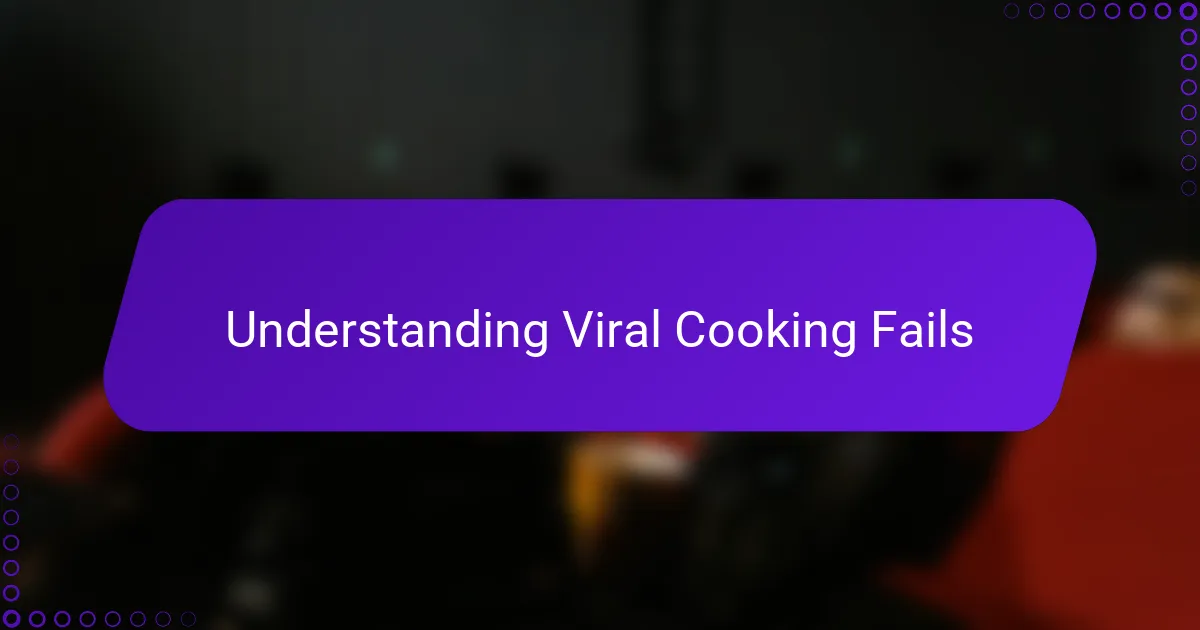
Understanding Viral Cooking Fails
Viral cooking fails capture my attention because they remind me that cooking is as much about trial and error as it is about skill. Have you ever tried following a recipe perfectly, only for it to turn out nothing like the picture? Those moments, though frustrating at the time, often become the funniest stories to share later.
What makes these cooking mishaps so relatable is their unpredictability. One minute, someone is confidently flipping pancakes, and the next, there’s a kitchen disaster caught on camera that spreads like wildfire. I find myself laughing not just at the fail but at the universal experience of imperfection.
Sometimes, I wonder why we’re so drawn to watching others fail in the kitchen. Is it the reassurance that nobody is perfect? Or maybe it’s the shared joy of turning a mistake into a moment of entertainment. From my perspective, viral cooking fails are a delightful reminder that cooking, and life, don’t always go as planned.
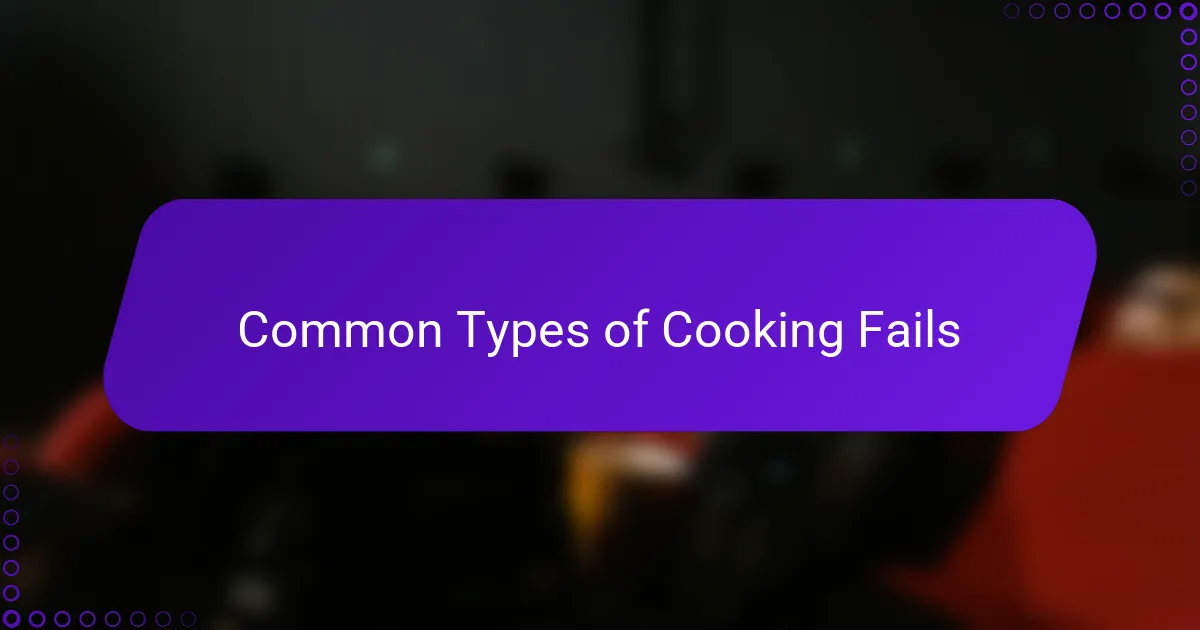
Common Types of Cooking Fails
One type of cooking fail I often see is the classic ingredient swap gone wrong. I remember once trying to substitute baking powder with baking soda, thinking they were interchangeable. Spoiler alert: my cake turned into a flat, sad-looking pancake, and I couldn’t help but laugh at my overly optimistic decision.
Burnt food is another frequent culprit. Who hasn’t set a timer and then gotten completely distracted by something else? I’ve had moments where I proudly announce dinner’s ready only to find a smoking pan and a charred mess. It’s frustrating, sure, but also strangely satisfying to witness these mishaps on video because they’re so common.
And what about the epic plating disasters? Sometimes the food looks great, but when it comes to presentation, things fall apart—literally. I’ve seen videos where cakes collapse or sauces are poured everywhere, and I wonder if these fails teach us more about patience and humility in the kitchen than any perfect recipe ever could. Don’t you think these moments remind us that cooking is as much an art as it is a science?
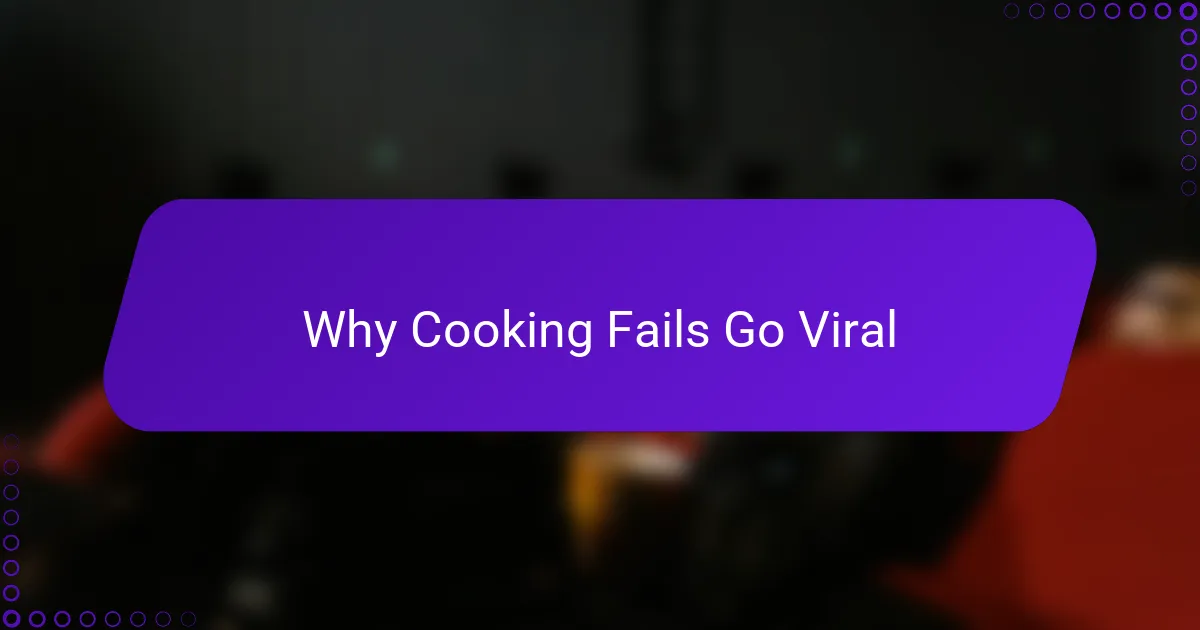
Why Cooking Fails Go Viral
There’s something oddly satisfying about watching cooking fails go viral, isn’t there? I think it’s because these moments mix humor with vulnerability—when someone’s carefully crafted dish suddenly turns into a kitchen catastrophe, it feels like we’re all reminded that perfection is overrated. Have you noticed how quickly these clips spread? It’s like a shared wink among us, saying, “Hey, you’re not alone in messing things up.”
From my experience, these fails strike a chord because they tap into a universal experience. We all have those times when a simple recipe spirals out of control. Seeing someone else’s blunder helps me embrace my own mistakes and laugh a little louder. Plus, the unexpected chaos is just plain entertaining—sometimes more than a polished cooking show could ever be.
I also believe the viral nature of these videos comes from their relatability paired with surprise. Nobody expects a beautiful soufflé to collapse or pancakes to end up on the ceiling. That unexpected twist sparks joy and curiosity in me every time. Isn’t it funny how a burnt toast or a dripping cake can bring so much connection and laughter across the internet?
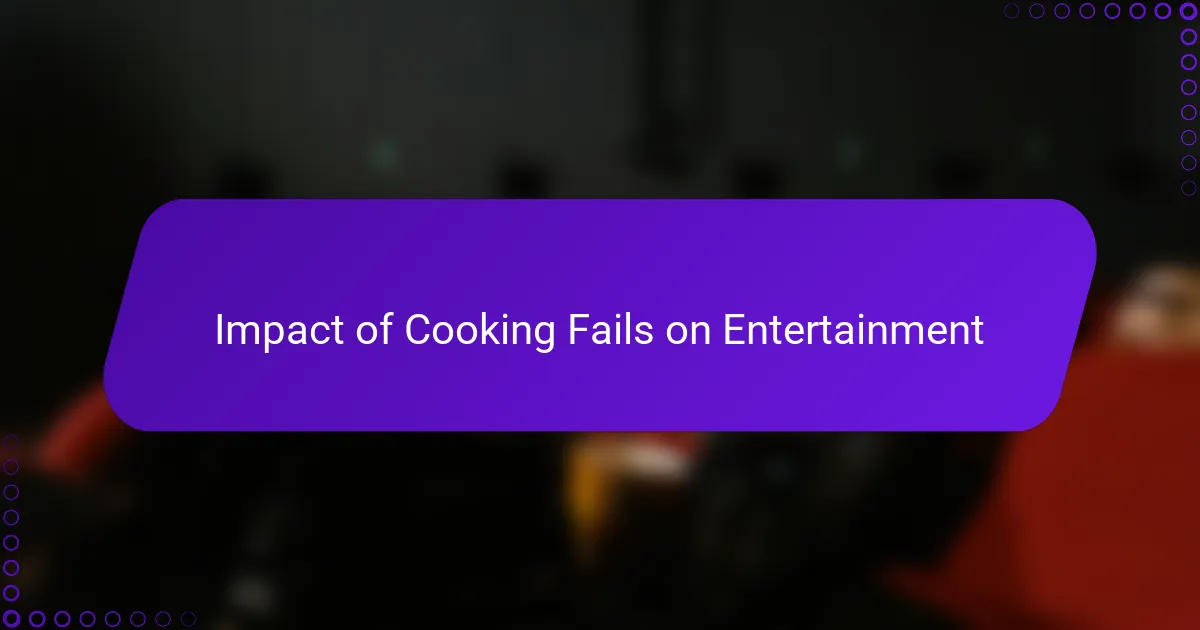
Impact of Cooking Fails on Entertainment
Watching cooking fails has genuinely transformed entertainment for me. These clips offer a refreshing break from polished perfection, reminding me that real life is messy and unpredictable—qualities that make entertainment feel more genuine and relatable. Have you ever found yourself chuckling uncontrollably at a kitchen disaster, only to feel oddly comforted afterward?
I think the impact goes beyond just humor. Cooking fails create a sense of community; as I watch, I feel connected to others who share similar kitchen blunders. It’s like we’re all part of an unspoken club laughing together at our collective imperfections. Doesn’t that shared laughter make these videos feel more engaging than some scripted entertainment?
What’s fascinating is how these fails spark creativity and inspiration in me. Seeing someone turn their epic disaster into a funny story encourages me to approach my own cooking experiments with a lighter heart. In a way, these entertaining mishaps teach valuable lessons about resilience and not taking ourselves too seriously. Isn’t that a refreshing twist on what entertainment can offer?
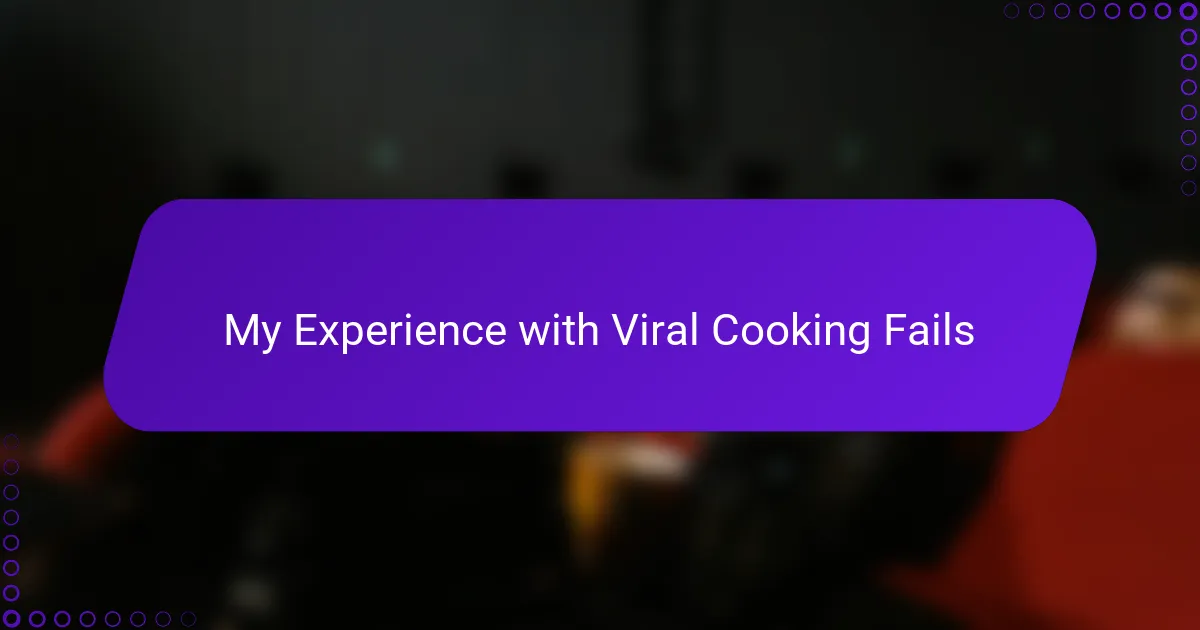
My Experience with Viral Cooking Fails
I’ve had my fair share of cooking fails that could rival any viral video. Once, I enthusiastically tried to make homemade bread, but instead of a fluffy loaf, I ended up with a dense brick that could probably double as a doorstop. It was embarrassing at first, but looking back, it became one of those “you had to be there” moments that I now laugh about with friends.
What struck me most during these mishaps is how quickly frustration turns into amusement. I remember burning my first batch of cookies so badly that the smoke alarm became the soundtrack of the evening. At that moment, I was tempted to give up, but watching similar fails online gave me a sense of camaraderie—it’s as if we’re all in this unpredictable kitchen adventure together.
Have you ever noticed how these cooking fails make us reflect on our own experiences? For me, they serve as a reminder that mistakes are part of the learning curve. Instead of feeling defeated, I now see each fail as an opportunity to improve and, frankly, to gather more stories worth sharing. Isn’t that what makes cooking—and life—a little more interesting?
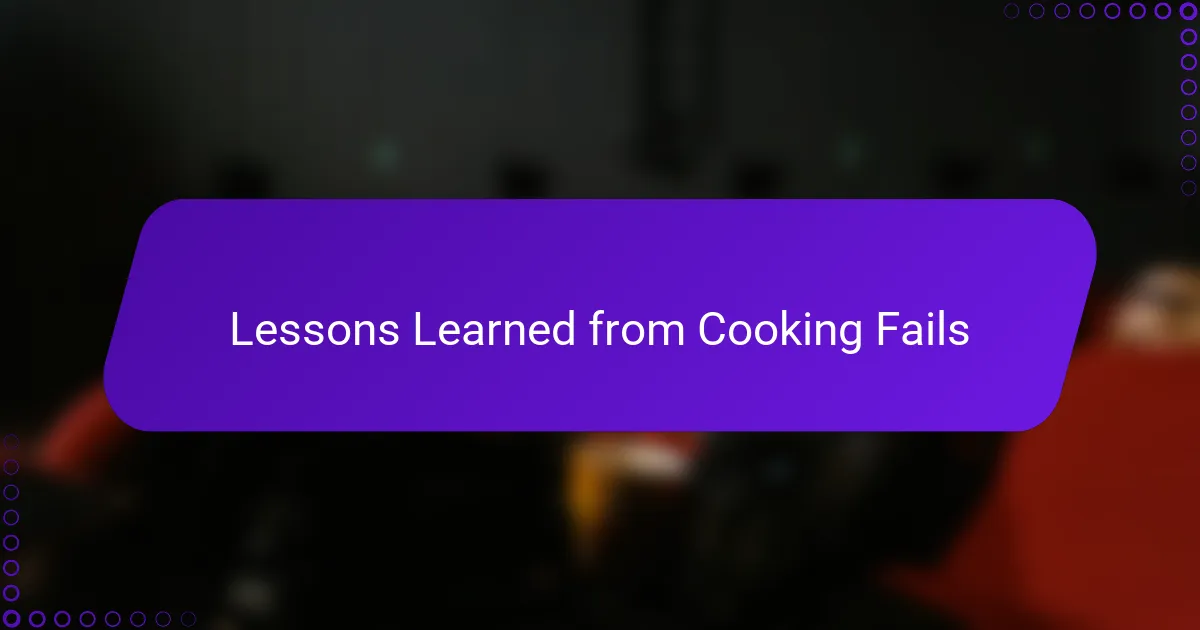
Lessons Learned from Cooking Fails
One lesson that cooking fails have taught me is to embrace patience. When I rushed through a recipe, ignoring the little signals from the food, disaster wasn’t far behind. Have you ever found yourself impatiently flipping a pancake only to have it break apart? These moments remind me that good things truly take time, even in the kitchen.
Another insight I’ve gained is the importance of not taking mistakes too seriously. I once spilled an entire bowl of batter across my countertop and could have easily let frustration take over. Instead, I paused, laughed, and cleaned up, turning the fail into a small adventure. Doesn’t finding humor in mishaps make the whole process more enjoyable?
Finally, cooking fails have reinforced the value of experimenting without fear. Even when a dish turns out completely wrong, I’ve realized it’s a step toward mastering a skill. Each misstep is like a lesson written in flour and spilled sauce, urging me to try again with a bit more knowledge and a lot less pressure. Have you ever thought about how every fail secretly pushes us closer to success?
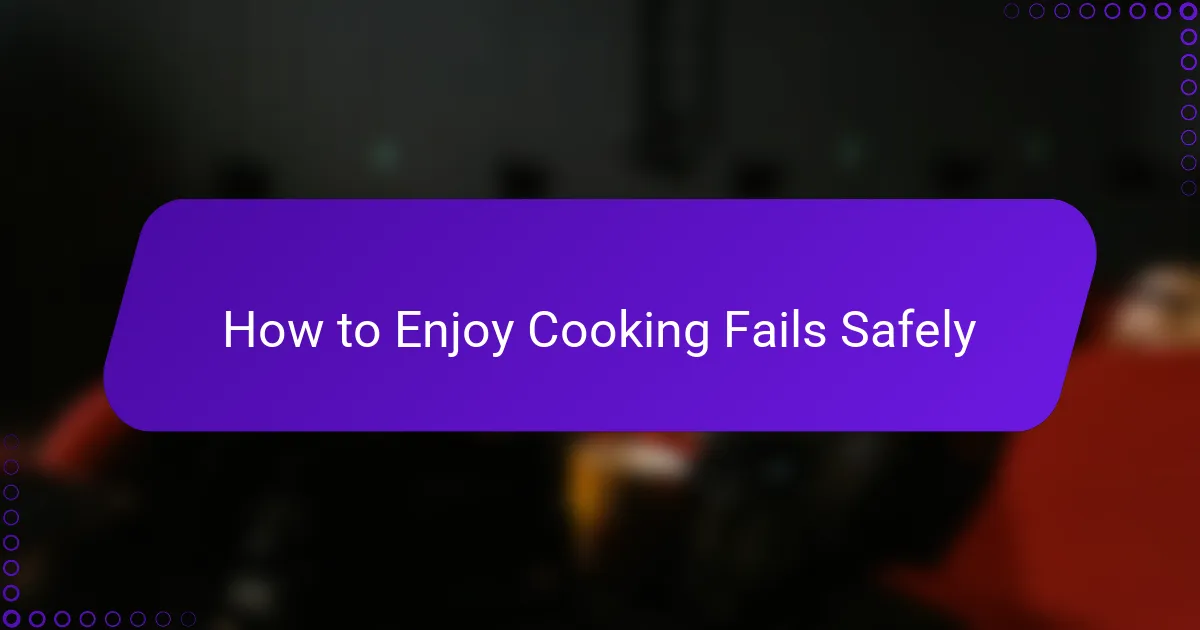
How to Enjoy Cooking Fails Safely
Enjoying cooking fails safely means keeping a sense of humor while also respecting kitchen safety. I’ve learned the hard way that laughing at a burnt dish is fun—until smoke sets off the alarms or hot oil splatters unexpectedly. Have you ever forgotten to turn off the stove because you were too caught up in the funny moment? That’s why staying attentive, even in chaos, is essential.
Another thing I remind myself is to avoid trying risky stunts just for entertainment value. Watching someone juggle knives or ignore food allergies might be hilarious online, but in real life, it can lead to serious trouble. Isn’t it better to enjoy the mishaps that happen naturally rather than inventing dangerous scenarios for views?
Finally, I find it helpful to share these fails with friends or family in a relaxed setting. That way, we can all laugh together without anyone feeling embarrassed or unsafe. Turning a cooking fail into a bonding moment makes the experience not just funny but genuinely memorable—don’t you agree that laughter is best when it’s shared safely?
